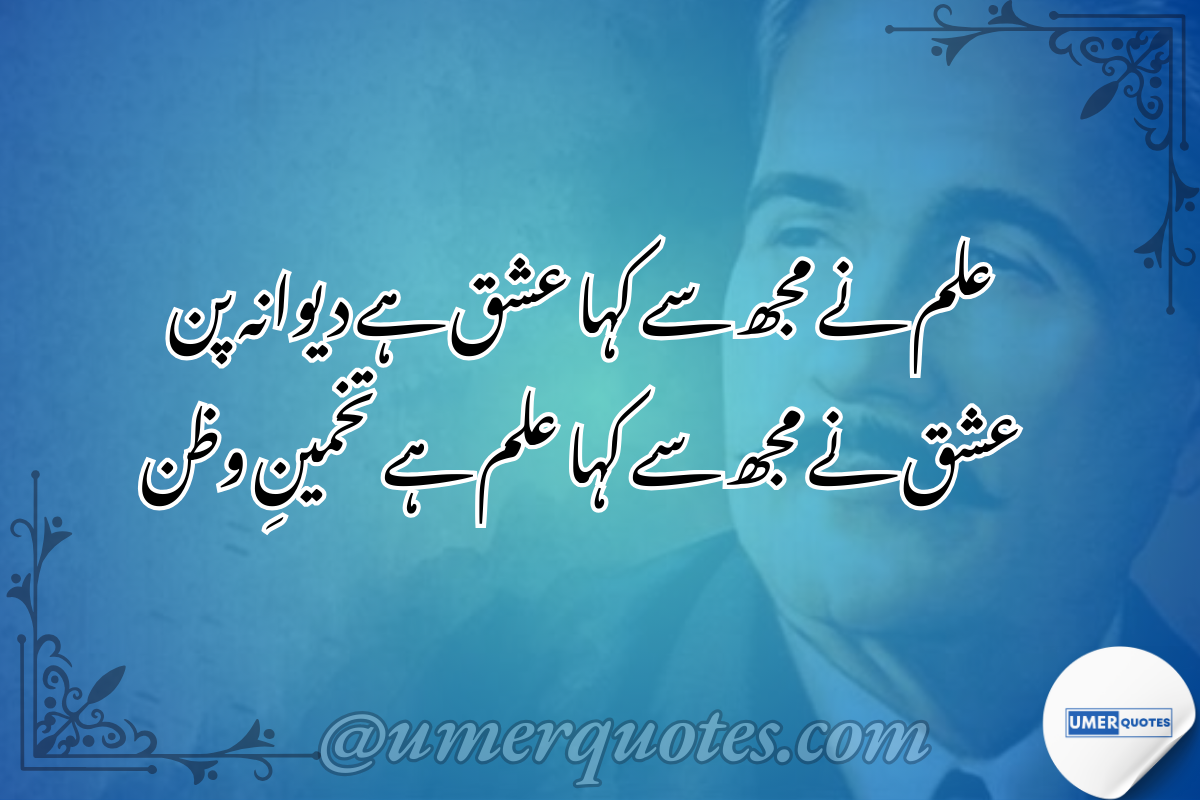
میرے بچپن کے دن بھی کیا خو ب تھے اقبالؔ
بے نما زی بھی تھا اور بے گناہ بھی
These poems describe the memories of Allama Iqbal’s youth and childhood in his poetry, where he remembers his innocence and innocence on the one hand, and on the other hand feels the simplicity and sincerity of that era.Iqbal is referring here to the beautiful memories of his childhood.
How good were my childhood days, Iqbal:
- Childhood: This word not only refers to the age of childhood but also describes the innocence, simplicity, and carelessness of this age.
- Good: Iqbal is talking here about the beautiful memories of childhood when a person is free from the problems of the world, happy and carefree.
- According to Iqbal, the state of childhood was a state in which a person’s heart is pure, mind is free, and soul is innocent. They find this stage beautiful and memorable
Benama Zee was also innocent:
- Baynama Zee: This word shows the innocent state of man, where he is unaware of the conflicts and problems of the world.
- Sinless: In the state of childhood, man is free from sin, mistakes, and worldly entanglements. This age is not only innocence but also protection from any negative effects.
- Iqbal is talking here about the innocence of childhood, when man did not commit any kind of sin or evil. It is a state in which a person is used to just being happy and living a simple life.
Message:
Iqbal tries to remind the innocence and simplicity of childhood. They consider the best time when the soul of man was innocent and the mind was pure. These poems show the primitive state of man, when he is unaware of the problems and complexities of the world. Iqbal highlights that in the state of childhood, a person’s heart and mind are pure, and there is no evil in his life.

علم نے مجھ سے کہا عشق ہے دیوانہ پن
عشق نے مجھ سے کہا علم ہے تخمینِ وظن
These poems reflect the philosophy and thought of Allama Iqbal. Both love and knowledge play an important role in Iqbal’s poetry, and he often describes a kind of conflict and relationship between the two.
Knowledge told me love is madness:
- Knowledge: Iqbal here represents knowledge, which gives man the power of truth, logic and understanding.
- Ishq: Ishq is an emotional, spiritual passion that makes a person go beyond his limits, to obsession and submission.
- Madness: Knowledge, which speaks of reality and rationality, here expresses love as madness, because love sometimes leads to a state of ecstasy beyond reason and logic. According to knowledge, love is an uncontrollable passion that can distract a person from his intellect and balance.
Ishq told me that knowledge is estimation:
- Ishq: Ishq here challenges knowledge through its rapture and emotional intensity. Love leads a person to the depths of the heart and spiritual experiences.
- Knowledge is estimation: Ishq here acknowledges the reality of knowledge and says that knowledge is actually an estimation or guess, which is not complete to arrive at the ultimate truth. Knowledge makes inferences based on reason and experience, but the experience of love is more direct and profound.
- Ishq here considers knowledge as limited, because knowledge is limited only to external realities, while Ishq acquaints man with a deeper, illogical reality.
Message:
In these poems, Iqbal shows the conflict between love and knowledge and their different aspects. While science tries to understand reality through logic, love takes a person deeper into emotions and spirituality. Iqbal considers both important, but he also says that unless a person balances the heart and the mind, he cannot fully understand the reality of both.
Here are more of Allama Iqbal poetry

سجدہ خالق کو بھی،ابلیس سے یا رانہ بھی
حشر میں کس سے محبت کا صلہ مانگے گا؟
These poems are part of Allama Iqbal’s profound intellectual and spiritual poetry, which highlights the inner conflicts and moral questions of man. Iqbal here sheds light on prostration, love and its moral aspects.
Sajdah to the Creator, and Yarana to Iblis:
- Sajdah to the Creator: It is a spiritual act, aimed at worshiping and loving Allah. Prostration shows the sincerity and devotion of man, who truly bows down to the Creator.
- Aid to Iblis: In this stanza, Iqbal also refers to Iblis (Satan), who leads man astray and deviates from the path of Allah. “Yarana” here means deep love or connection with someone. Iqbal describes the paradox here that if a person worships Allah on the one hand, then on the other hand he can also join in the deceptions of Iblis.
- Iqbal’s message is that man is sometimes unable to balance spirituality and worldly love and is walking on both opposite paths.
Who will ask for the reward of love in fate?
- Hashar: It refers to the Day of Resurrection, when every person will have to give an account of his deeds.
- The reward of love: In this stanza, Iqbal asks a man that when the day of judgment comes and his actions are taken into account, from whom will he ask for the reward of his love? Will he ask Allah for the reward of his worship and love, or will he hide his association with Iblis and the effects of his misguidance?
- Iqbal reminds man here that if man does not recognize the true reality of his love and relationships in his life, then he will have to answer for it in the resurrection.
Message:
In these poems, Iqbal shows the internal conflict of man that on one hand, man worships Allah, while on the other hand, he gets lost in the influence of Iblis or worldly loves. They raise the question that if a person is walking on both paths, then who will he ask for the reward of his love and deeds in the Day of Judgment?. Iqbal emphasizes that a person should keep his love, faith and relationships clean and correct, so that on the Day of Resurrection he may ask Allah for the reward of his deeds and his relationship with Allah is pure.

داغِ سجود اگر تیری پیشانی پر ہوا تو کیا
کو ئی ایسا سجدہ بھی کر کہ زمین پر نشاں ر ہیں
These poems are a beautiful and profound part of Allama Iqbal’s poetry, which presents a new concept of the reality of prostration, the spirituality of man, and his nature. Iqbal here describes prostration and its meaning at a higher level, where a person not only worships sincerely, but also has the effect and sign of his prostration. Let us explain this verse in detail:
What if the scar of prostration was on your forehead?
- Dagh-e-Sajjud: “Dagh” means a mark or impression, and “Sajjud” means worship or prostration. Iqbal presents a concept here where the effect of prostration appears as a “spot” on a person’s forehead.
- In this stanza, Iqbal raises the question that if the effect of prostration appears on a person’s forehead, can this scar be a sign of something negative? Or can this scar become a deep mark of a person’s spirituality, sincerity, and relationship with Allah?
- Here Iqbal describes the fact that prostration has a real effect on the soul and body of a person, and this effect can be noticeable in a person’s personality.
Prostrate in such a way that there is a mark on the ground:
- Such Sajdah: Iqbal is talking about a high Sajdah here, which is not only physical but spiritual and deep in the heart.
- Be a mark on the earth: Iqbal wants the Sajdah to be so full of sincerity, so true, that its effect is not limited to the soul of man, but that effect is also visible on the earth. It is a symbolic expression that the effect of a person’s prostration is also present on the material level of the world, such as the traces of a virtuous or great personality.
- Here, Iqbal wants to highlight the reality of Sajdah not only in the spiritual world but also in the material world, that is, the action and worship of a person should be so high that its effect reaches the hearts of people and leaves a mark in their minds.
Message:
In this poem, Iqbal describes the reality of prostration in depth. They want Sajdah to be not just a physical act, but a spiritual experience that deeply affects the inner world of man. The effect of Sajdah should not be limited to worship alone, but should have an effect on a person’s personality, actions, and even the world around him. Iqbal calls for a prostration that brings about a positive and elevated change in man and its effect is felt in the entire environment.




